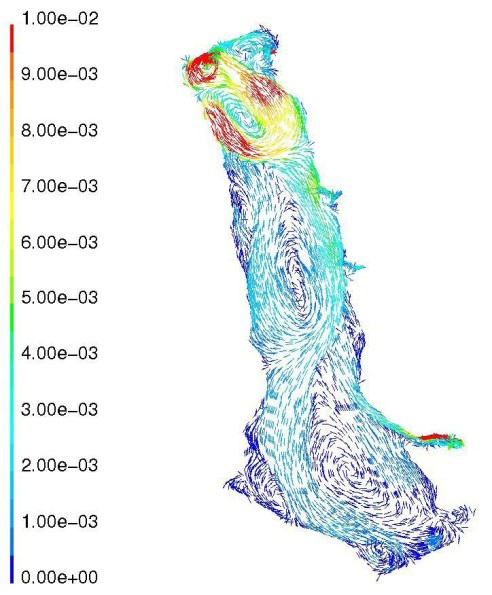Cryptosporidium Risk Assessment Using CFD
Many reservoirs and water treatment works (WTW) within the UK are adjacent to farmland. This means there is a possible risk of cryptosporidium pollution within these water supplies during periods of heavy rainfall. This pollution is difficult to remove in the WTW and there have been several incidents in recent years where urban populations have been infected by contamination of reservoir water supplies.
It is very difficult to anticipate when a pollution event may occur. However, to deal effectively with an event, the operating company needs information on the reservoir’s natural flow patterns. With this knowledge it is possible to gauge the importance of different release sources and thereby implement measures that would reduce their impact and risk to the population at large.
Surface Flow Patterns for Reservoir in Normal Flow Conditions Material Temperatures at Same Duty
Contamination Dispersion Models
MMI Engineering has many years’ experience in the successful application of flow modelling techniques across a range of process industries. In particular, MMI has applied Computational Fluid Dynamics (CFD) to model the dispersion and convection of contaminants in reservoirs. In this way, important flow features such as recirculation zones, short-circuiting and flow stagnations can be highlighted.
Reducing the Risk
We have developed a risk assessment method for quantifying the impact of a cryptosporidium release event. Response curves at the reservoir off takes can be monitored in the model with respect to potential releases from coastal sources. The model can provide the WTW plant operators with detailed information, such as peak arrival time, peak concentration, dilution factors and mixing effectiveness. Analysis of this information can then highlight which release points pose the greatest risk and the relative magnitude of this risk.
Bubble Barriers & Air Stones
Bubble barriers are commonly used to disperse algal blooms, but they can also be positioned to effectively screen the treatment works and provide dilution and dispersion of the Cryptosporidium oocysts.
For more information surrounding our risk assessment capabilities in the Water Industry, please contact us on 0117 960 2212 (Bristol) or email us.
